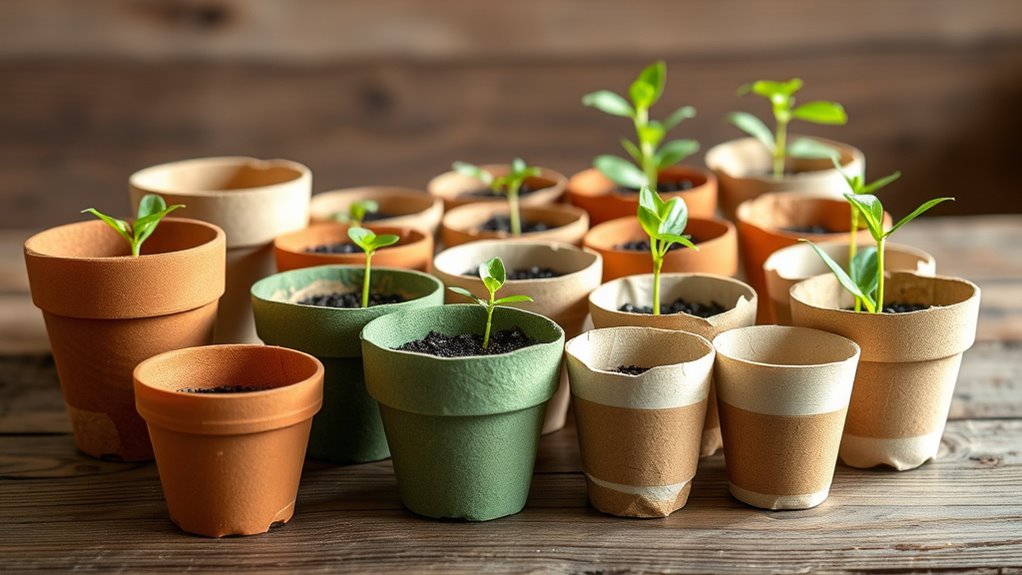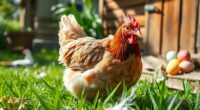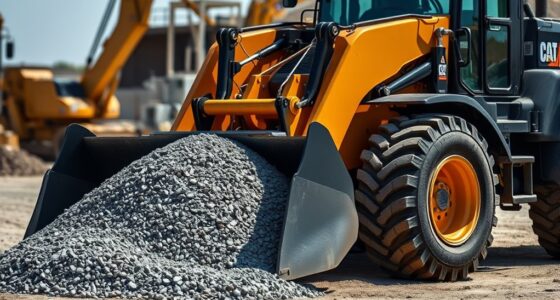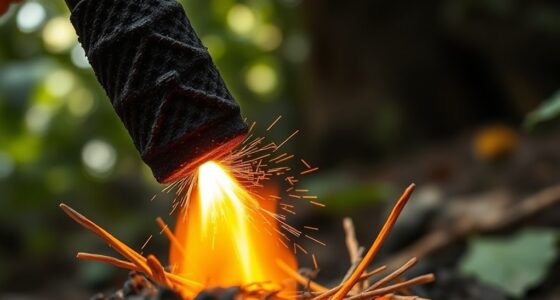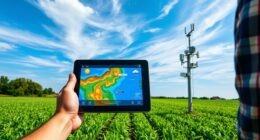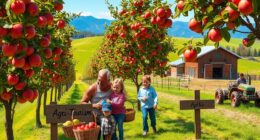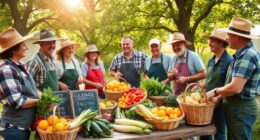If you’re looking for eco-friendly seedling pots, I recommend options like peat, coconut coir, or recycled paper containers, which decompose naturally within a few months and support healthy root growth. Many come with handy features such as drainage, labels, and easy transplanting. From large trays to small individual pots, there’s a variety suited to different plants and needs. Keep exploring to find the best biodegradable pots that match your gardening style and eco goals.
Key Takeaways
- Made from sustainable, biodegradable materials like recycled pulp, coconut coir, and plant fibers for eco-friendly seed starting.
- Designed with features such as drainage holes and transplant-friendly structures for healthy root development.
- Available in various sizes and shapes to accommodate different seed types and gardening needs.
- Support natural decomposition, enriching soil and reducing plastic waste during transplanting.
- Suitable for hobbyists, gardeners, and nurseries seeking easy-to-use, environmentally responsible seedling containers.
240 Cells Peat Pots Seed Starter Tray Kit with 24 Labels and Transplant Tools
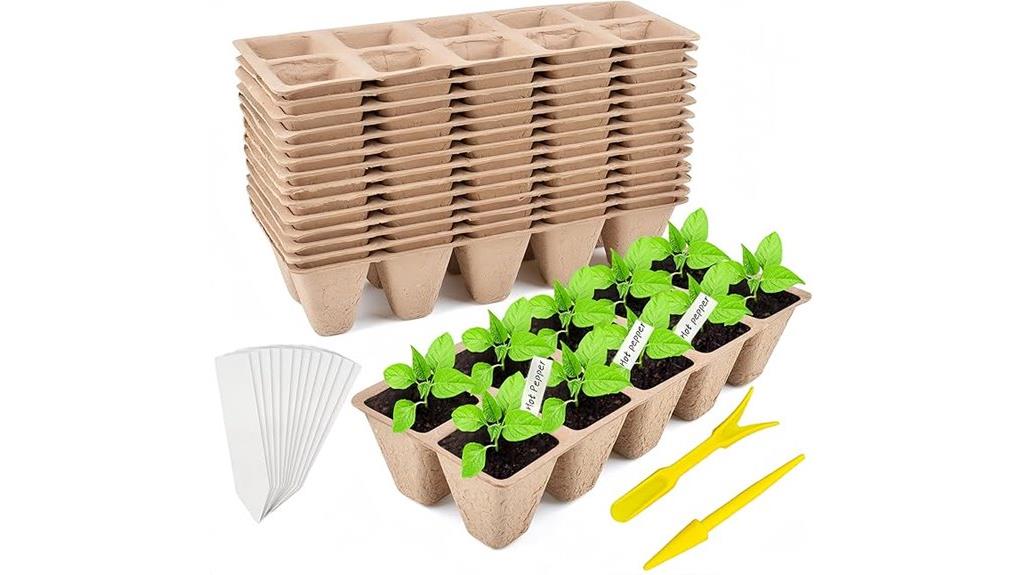
If you’re looking for an eco-friendly way to start your seedlings, the Cells Peat Pots Seed Starter Tray Kit is an excellent choice. It features 240 biodegradable paper pulp pots, perfect for seed starting and seedling growth. The included labels help you keep track of your plants, while the transplant tools make handling easy. With drainage holes for healthy root development, these trays support robust germination. Their modern, wood-colored design adds a touch of style to your gardening setup. Suitable for both indoor and outdoor use, this kit simplifies transplanting and promotes healthy seedlings without disturbing roots. It’s a practical, sustainable option for gardeners at any level.
Best For: gardeners of all experience levels seeking an eco-friendly, efficient way to start seedlings indoors or outdoors.
Pros:
- Biodegradable paper pulp pots promote healthy root growth and easy transplanting.
- Includes labels and transplant tools for organization and convenience.
- Drainage holes ensure proper aeration, supporting robust seedling development.
Cons:
- Slightly smaller cell size may not accommodate larger seed varieties.
- Some users find the trays a bit fragile during handling.
- The wood-colored design may not match all gardening aesthetics.
126 Packs Square Peat Pots, 3.15 Inch Seed Starting Pots
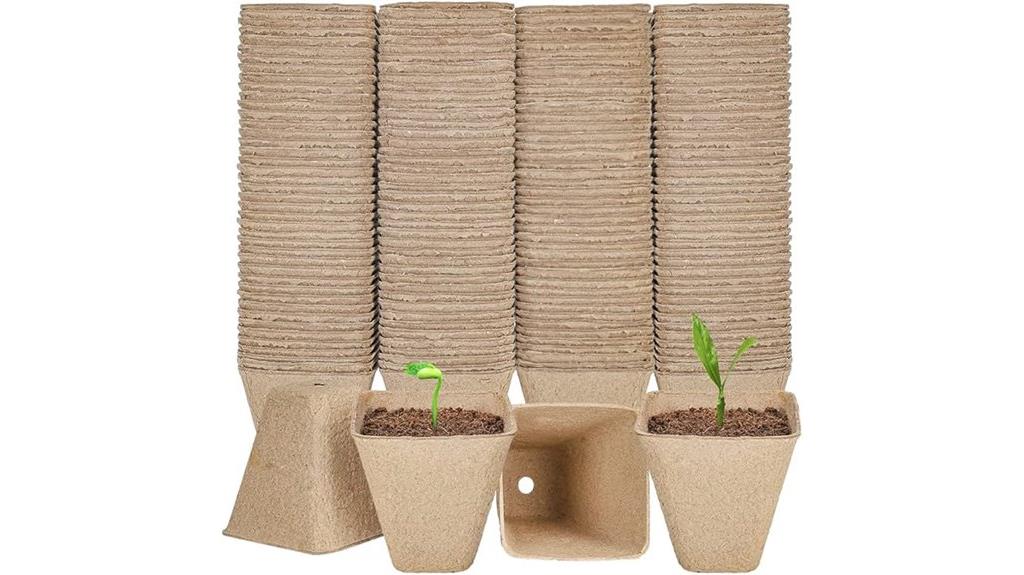
These 126 packs of square peat pots are an excellent choice for eco-conscious gardeners who want to start seedlings sustainably. Made from biodegradable pulp and plant fibers, they’re designed with drainage holes to promote healthy root growth and prevent overwatering. Their compact, 3.15-inch size is perfect for starting flowers, herbs, and vegetables, and they can be planted directly into the soil, reducing transplant shock. Lightweight and sturdy, these pots break down naturally in the ground, supporting eco-friendly gardening practices. Plus, the minimalist, rustic finish makes them suitable for both indoor and outdoor use, making seed starting more convenient and environmentally responsible.
Best For: eco-conscious gardeners and plant enthusiasts seeking sustainable, biodegradable seed-starting containers for indoor and outdoor use.
Pros:
- Made from biodegradable pulp and plant fibers, promoting eco-friendly gardening.
- Drainage holes ensure proper water flow and healthy root development.
- Can be planted directly into soil, reducing transplant shock and saving time.
Cons:
- Potential mold growth if stored improperly or stacked without protection.
- Slightly fragile compared to plastic pots, requiring careful handling.
- May break down faster if exposed to excessive moisture or improper storage conditions.
Homenote Peat Pots, 30 Pcs 4 Inch Seed Starting Pots
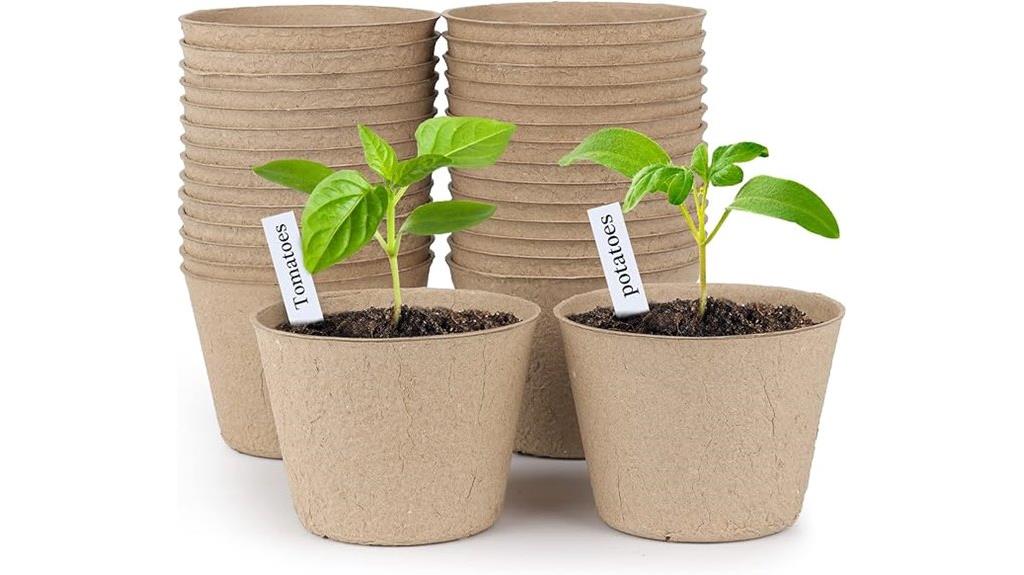
Homenote Peat Pots, 30 pcs, 4-inch seed starting nursery pots, are an excellent choice for gardeners and hobbyists seeking an eco-friendly way to start their seedlings. Made from recycled, biodegradable pulp, they promote healthy root growth with their breathable design and drainage holes, preventing waterlogging. These sturdy yet thin pots are suitable for indoor and outdoor use, and they can be planted directly into soil, reducing transplant shock. Plus, with 20 bonus plant labels included, identifying your seedlings becomes easy. Overall, they offer a durable, sustainable, and convenient solution for starting a variety of plants while minimizing waste.
Best For: home gardeners, hobbyists, and small-scale growers seeking eco-friendly, durable seed starting pots for indoor or outdoor use.
Pros:
- Made from recycled, biodegradable pulp, promoting sustainability and reducing waste.
- Breathable design with drainage holes prevents waterlogging and encourages healthy root development.
- Includes bonus plant labels, making seed identification quick and easy.
Cons:
- Slightly more watering required since the pots do not absorb moisture from the soil.
- Thinner material may be less durable over extended use or handling.
- Limited to 4-inch size, which may not suit larger plants or longer growth cycles.
ANGTUO 30 Pcs Peat Pots for Seedlings
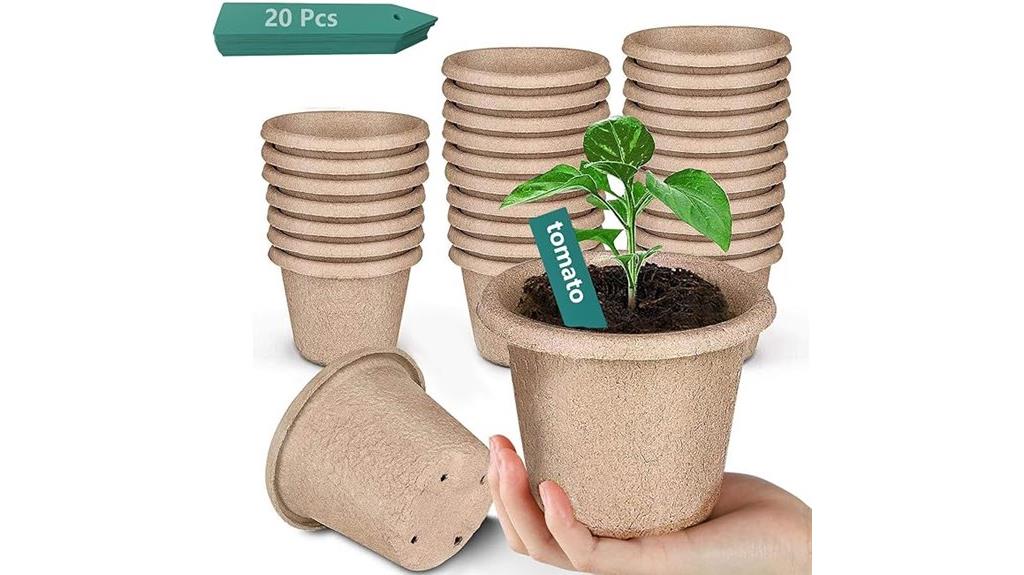
ANGTUO’s 30 Pcs Peat Pots are an excellent choice for gardeners seeking eco-friendly seedling containers that simplify transplanting. Made from recycled paper, these biodegradable pots are sturdy, round, and feature drainage holes to promote healthy root growth. Each roughly 4.33 inches in diameter, they’re suitable for a variety of seedlings like herbs, vegetables, and flowers. The included plant labels help with organization. These pots break down naturally over time, reducing waste and supporting sustainable gardening. Users find them easy to use, effective for transplanting, and a convenient alternative to plastic pots, making them ideal for both hobbyists and professionals.
Best For: hobbyist and professional gardeners seeking eco-friendly, durable seedling containers that facilitate easy transplanting and promote healthy root development.
Pros:
- Biodegradable and environmentally friendly, supporting sustainable gardening practices
- Sturdy, thick material with drainage holes for optimal moisture control and root health
- Includes plant labels for better organization and identification of seedlings
Cons:
- Potential for mold growth if not properly ventilated or stored
- Narrow bases may lead to instability or deformation after multiple waterings
- Some users report shape deformation and durability issues over time
Back to the Roots Organic & Plantable Seed Starting Pots (24 CT)
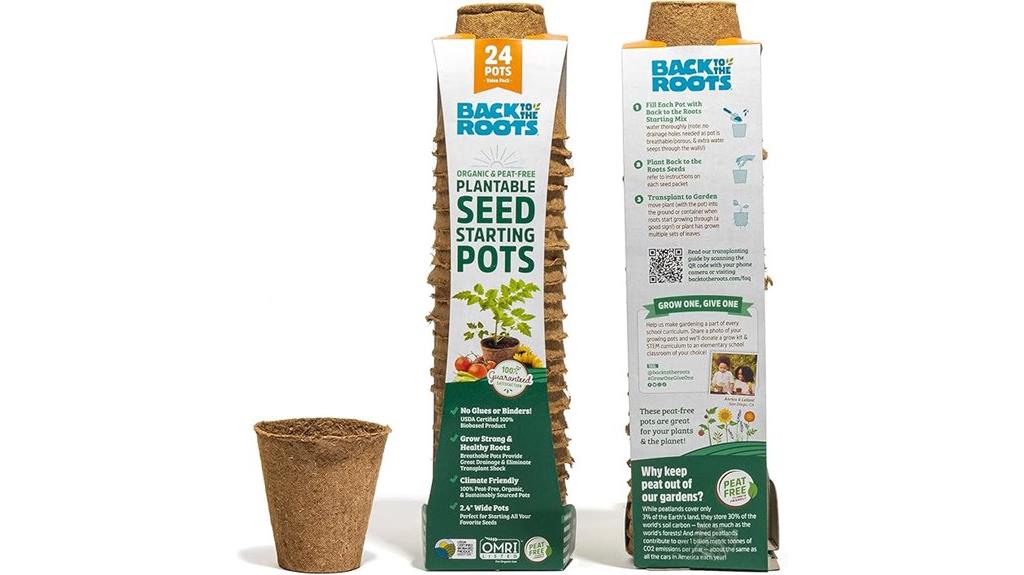
If you’re looking for an eco-friendly way to start your garden, Back to the Roots Organic & Plantable Seed Starting Pots are an excellent choice, especially for beginners and sustainable gardeners. Made from 100% organic, sustainably sourced wood fibers, these peat-free pots are USDA Certified 100% Biobased Products. Their 3-inch diameter size is perfect for seedlings, with drainage holes that promote healthy root growth and reduce transplant shock. Lightweight, sturdy, and ready to use right out of the box, they can be planted directly into the soil, supporting eco-conscious gardening and making transplanting hassle-free. Plus, their compostable design helps reduce plastic waste.
Best For: eco-conscious gardeners, beginners, and anyone looking for sustainable seed-starting solutions that simplify transplanting and promote healthy plant growth.
Pros:
- Made from 100% organic, sustainably sourced wood fibers, ensuring eco-friendly use.
- Fully biodegradable and plantable, reducing plastic waste and supporting sustainable gardening practices.
- Designed with drainage holes to promote healthy root development and minimize transplant shock.
Cons:
- Limited to seed starting and may not be suitable for larger plants or long-term use.
- Slightly higher cost compared to traditional plastic pots.
- May require careful handling when transplanting to avoid damaging delicate seedlings.
100pcs Peat Pots for Seedlings
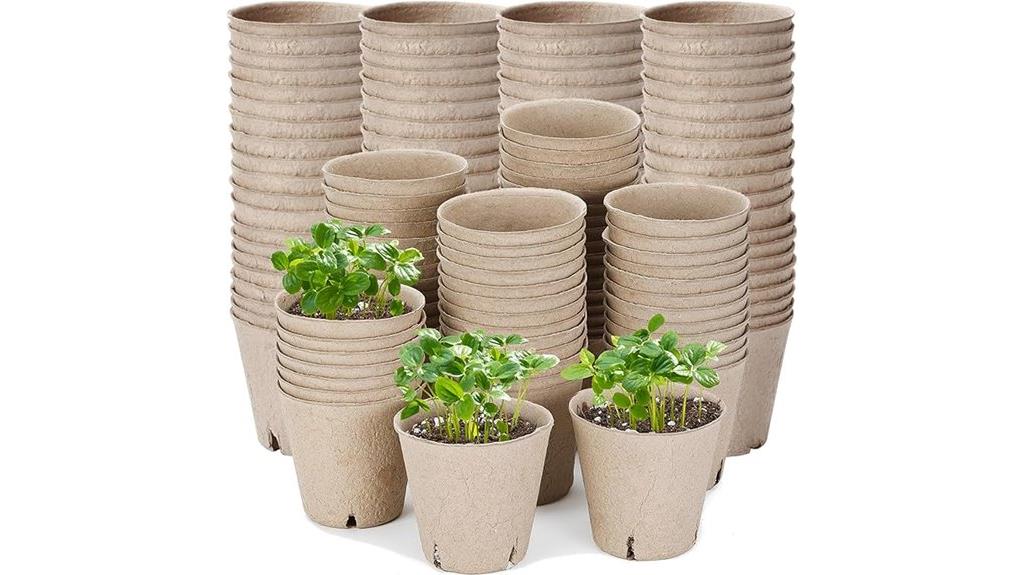
For gardeners and growers seeking an eco-friendly and efficient way to start seedlings, these 100pcs peat pots are an excellent choice. Made from natural, plant-based materials, they are fully biodegradable, breaking down easily in soil without harmful residues. Designed to promote healthy root growth, the pots allow roots to penetrate their walls, preventing circling and encouraging stronger plants. Lightweight and easy to handle, they can be planted directly into soil or larger containers, reducing transplant shock. Built to high standards, these versatile pots suit various seedlings, making them a cost-effective and sustainable solution for both hobbyists and professionals.
Best For: gardeners, hobbyists, and professional growers seeking an eco-friendly, cost-effective seed-starting solution that promotes healthy root development and simplifies transplanting.
Pros:
- Fully biodegradable and environmentally friendly, supporting sustainable gardening practices
- Promotes healthy root growth by allowing roots to penetrate the wall, preventing circling
- Lightweight, easy to handle, and suitable for direct planting into soil or larger containers
Cons:
- May require careful handling to avoid damage during transplanting due to delicate material
- Limited to seedling stages; not suitable for mature plants
- Some users may find the size unsuitable for larger or multiple seedlings at once
60 Pack 3.15 Inch Peat Pots for Seedlings with Drainage Holes
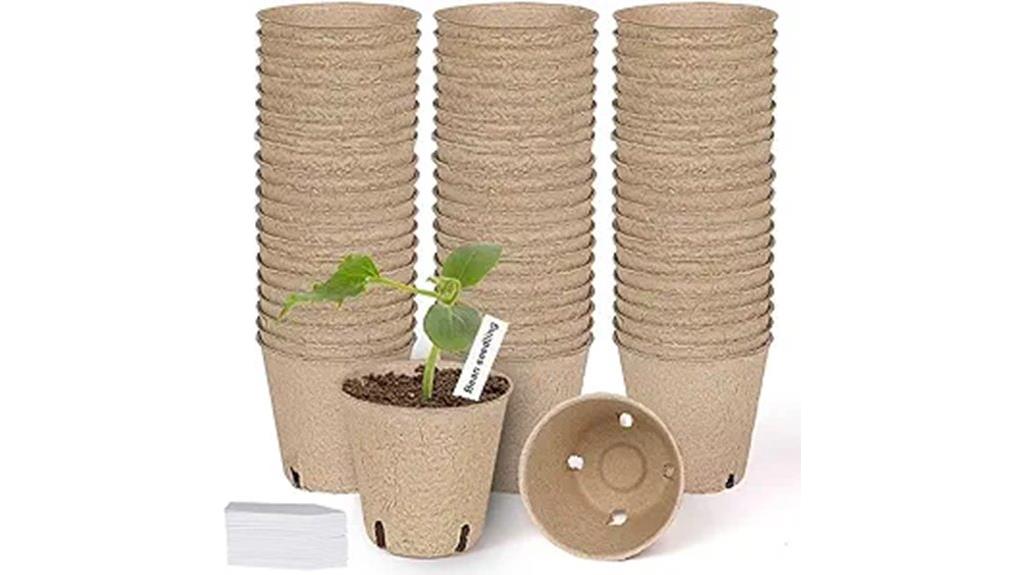
These 3.15-inch peat pots with drainage holes are perfect for gardeners and nursery operators seeking an eco-friendly, hassle-free way to start seedlings. The package includes 60 biodegradable pots, each with four drainage holes that ensure proper water runoff, promoting healthy root development. Made from recycled pulp and plant fibers, these pots are fully biodegradable, breaking down into organic nutrients when planted. You can transplant seedlings directly into the soil without removing them from the pots, which minimizes root disturbance and transplant shock. Ideal for vegetables, flowers, herbs, and succulents, they’re a versatile, sustainable choice for any seed-starting project.
Best For: home gardeners, nursery operators, and seed-starting enthusiasts seeking an eco-friendly, convenient way to nurture seedlings and transplant with minimal root disturbance.
Pros:
- Made from recycled pulp and plant fibers, fully biodegradable and environmentally friendly
- Equipped with four drainage holes to promote healthy water runoff and root growth
- Allows for direct transplantation into soil, reducing transplant shock and root disturbance
Cons:
- Limited to seedlings and small plants; may not support larger or mature plants
- Pulp material may be more fragile compared to plastic pots, requiring careful handling
- Single-use nature means additional cost over time if reused is desired
4 Inch Biodegradable Peat Pots with 20 Plant Labels (50 Pieces)
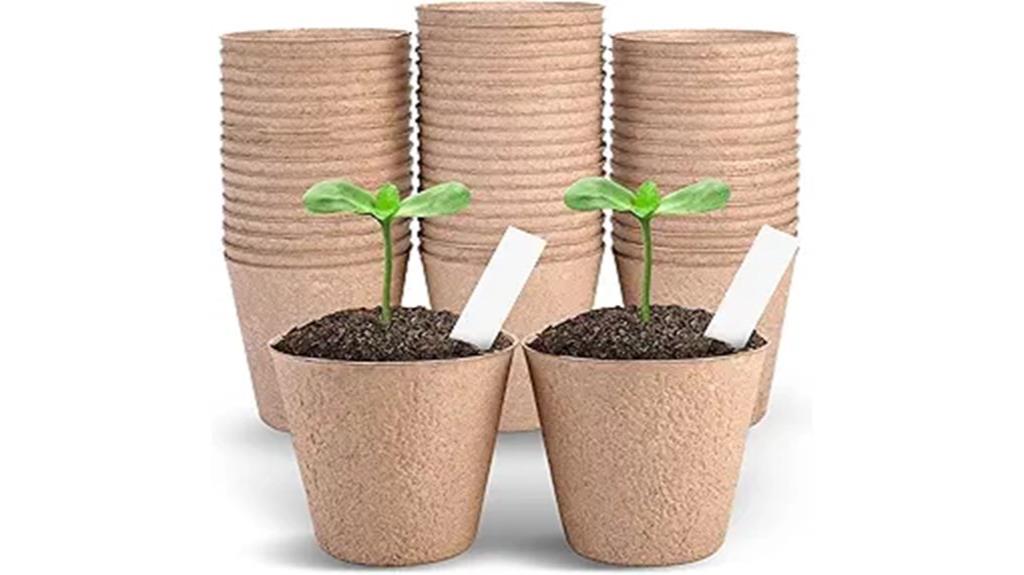
The Inch Biodegradable Peat Pots with 20 Plant Labels are an excellent choice for gardeners who want an eco-friendly way to start seedlings. These 4-inch round pots are made from biodegradable peat moss, providing excellent aeration to promote healthy root growth. They’re designed to break down naturally, making transplanting seamless and reducing root disturbance. Perfect for indoor and outdoor use, they suit vegetables, herbs, flowers, and succulents. The pack includes 50 pots and 20 labels, making it easy to mark your seedlings. Lightweight and versatile, they’re great for beginners and experienced gardeners alike, offering an eco-friendly alternative to plastic containers.
Best For: gardeners seeking an eco-friendly, biodegradable seedling container suitable for both indoor and outdoor planting projects.
Pros:
- Made from biodegradable peat moss, promoting eco-friendliness and natural decomposition.
- Designed with excellent aeration to support healthy root development.
- Includes 20 plant labels for easy seedling identification and organization.
Cons:
- Some users report that the pots have thin walls that may break or disintegrate easily.
- Water absorption may be inconsistent, risking overwatering or drowning seedlings.
- Concerns about environmental sustainability due to peat moss depletion and availability.
Square Peat Nursery Pots 150 Pcs 3in Biodegradable with Humidity Dome and Label
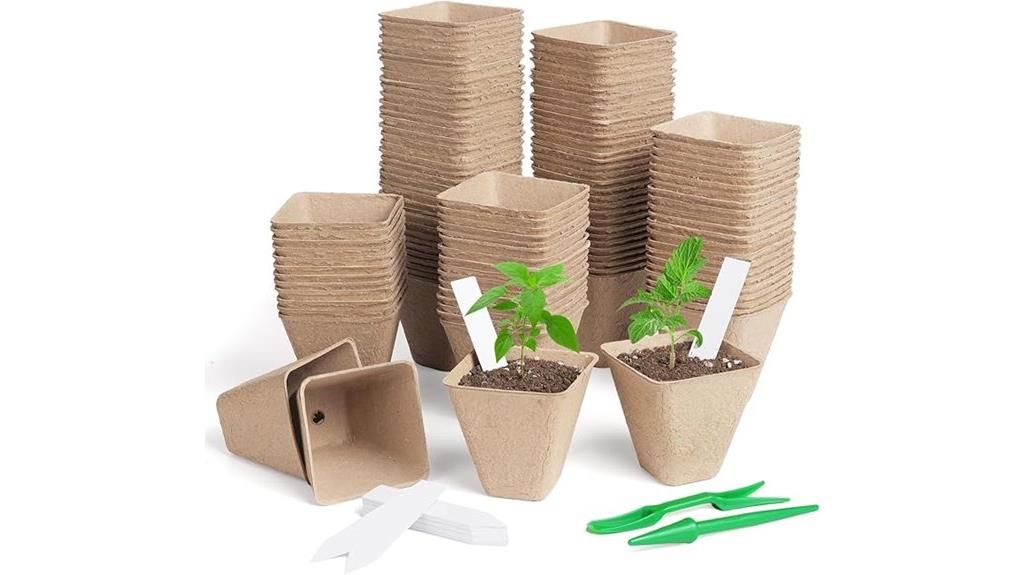
If you’re looking for an eco-friendly solution to start your seedlings, square peat nursery pots are an excellent choice. I like that these 150 biodegradable pots are made from pulp and plant fibers, which decompose into organic fertilizer. The included humidity dome and labels make seed tracking and moisture control easy, supporting healthy growth. Their 3-inch size is perfect for various plants like herbs, vegetables, and small trees. Although some users find the material fragile and prone to tearing when watered, these pots are cost-effective and ideal for outdoor or indoor seed starting, reducing transplant shock and waste.
Best For: home gardeners, nursery growers, and educators seeking an eco-friendly, cost-effective way to start seedlings indoors or outdoors.
Pros:
- Biodegradable material that enriches soil when decomposed
- Comes with humidity dome and labels for easy seed tracking and moisture management
- Suitable for a variety of plants, including herbs, vegetables, and small trees
Cons:
- Fragile material that can tear or disintegrate upon watering
- Short lifespan may require transplanting to sturdier containers
- Handling can be tricky due to shape instability and delicate construction
Biodegradable Peat Pots for Seedlings (120 Pack, 3.15 inch)
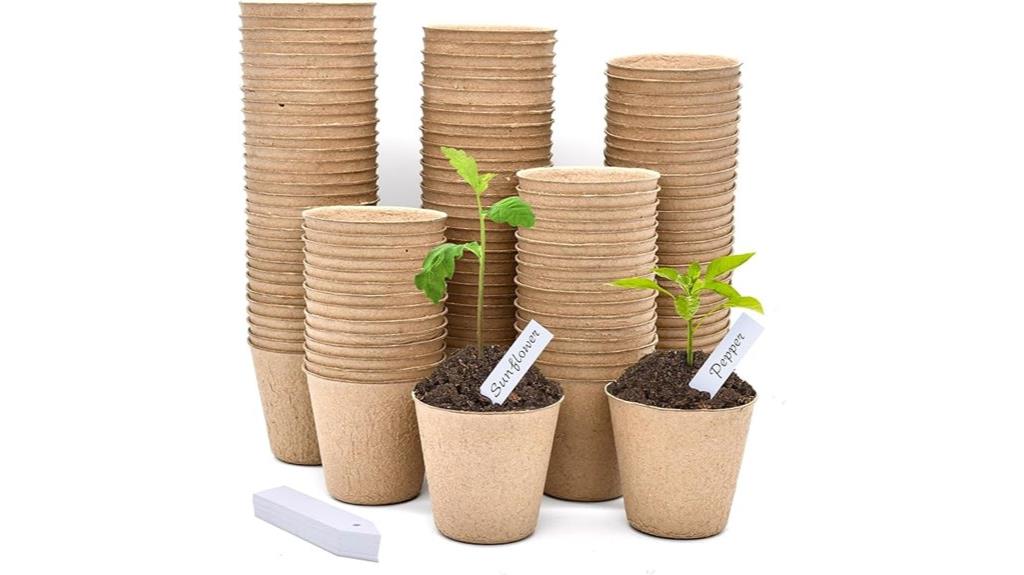
For gardeners looking for an eco-friendly way to start seedlings, biodegradable peat pots offer an excellent solution. This pack includes 120 pots, each measuring 3.15 inches, perfect for a variety of plants like vegetables, herbs, and flowers. Made from biodegradable paper and peat, these pots naturally decompose into organic fertilizer, reducing waste and environmental impact. They support direct soil planting or transfer to larger containers, helping prevent root circling and transplant shock. Plus, with 30 plant labels included, you can easily organize your seedlings. These versatile pots are a convenient, sustainable choice for nurturing healthy, vigorous plants from seed to transplant.
Best For: home gardeners, nursery operators, and eco-conscious growers seeking a sustainable and effective way to start seedlings and promote healthy plant growth.
Pros:
- Made from biodegradable paper and peat, environmentally friendly and compostable
- Supports healthy root development by eliminating root circling and reducing transplant shock
- Includes 30 plant labels for easy seed organization and identification
Cons:
- Limited to seed starting and small seedlings; may not be suitable for larger plants
- Peat material may degrade faster in very wet or poorly drained soil conditions
- Slightly more fragile than plastic trays, requiring careful handling during transplanting
Seed Starter Trays with 174 Biodegradable Peat Pots
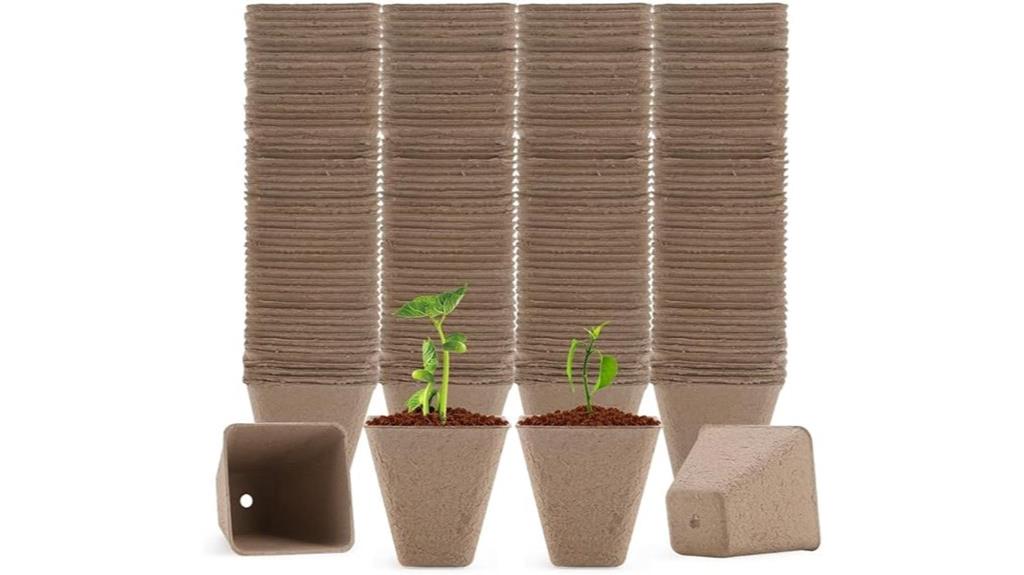
Gardeners seeking an eco-friendly way to start seedlings will find the Seed Starter Trays with 174 biodegradable peat pots an excellent choice. Each square pot measures 3.15 inches and is made from pulp and plant fibers, offering breathability similar to clay. The set includes 174 lightweight, textured pots with drainage holes, perfect for indoor and outdoor use. Designed by Sderoq, these pots decompose quickly into organic fertilizer, enriching your soil. They’re ideal for seedlings of vegetables, fruits, and plants, providing a healthy environment for roots while simplifying transplanting. Their affordability and eco-friendliness make them a practical choice for sustainable gardening.
Best For: home gardeners, hobbyists, and schools seeking an eco-friendly, affordable way to start seedlings indoors or outdoors.
Pros:
- Made from biodegradable pulp and plant fibers, environmentally friendly and quick to decompose.
- Includes 174 textured pots with drainage holes, promoting healthy root development and moisture control.
- Lightweight and easy to handle, suitable for both indoor and outdoor gardening projects.
Cons:
- Some users report issues with durability, with pots potentially breaking or deteriorating faster than expected.
- Possible risk of disease development if pots are not properly managed or cleaned between uses.
- Thinner construction compared to other brands may lead to faster drying or damage during handling.
3.5 inch Square Nursery Pots and Seedling Trays (60pcs)
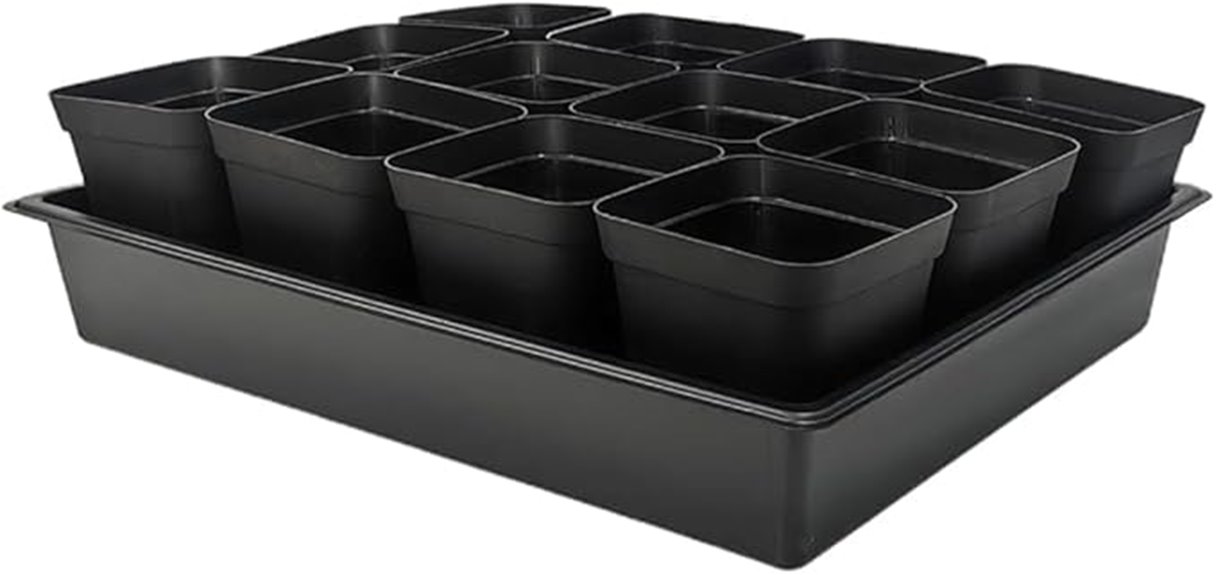
The inch square nursery pots and seedling trays from RooTrimmer are an excellent choice for anyone looking to start seedlings indoors or in greenhouses with ease and confidence. This set includes 60 durable, BPA-free plastic pots measuring 3.5 inches square and 5 sturdy seedling trays, perfect for microgreens, herbs, or vegetables. The trays, sized at 16.2 x 13.26 inches, lack drainage holes, making them ideal for indoor use. The pots feature bottom drainage, are reusable, and designed for easy transplanting and cleaning. With high ratings and positive reviews, these pots and trays provide a reliable, long-lasting solution for seed starting and plant propagation.
Best For: home gardeners, indoor growers, and nursery enthusiasts seeking durable, reusable seedling containers for starting microgreens, herbs, and vegetables indoors or in greenhouses.
Pros:
- Made from high-quality BPA-free, durable plastic, ensuring long-term reuse and resistance to deformation.
- Suitable for various seedling types, including microgreens, herbs, and small vegetables, with easy transplanting and cleaning.
- Sturdy seedling trays without drainage holes are ideal for indoor use on floors or tables, providing stable support for seedlings.
Cons:
- Slight odor may be present from new products, requiring airing out before use.
- No drainage holes in trays, which may require careful watering management to prevent overwatering.
- Some minor packaging dents reported, though they do not affect the functionality of the products.
Deepthi 4-Inch Coco Coir Nursery Pots (Pack of 12)
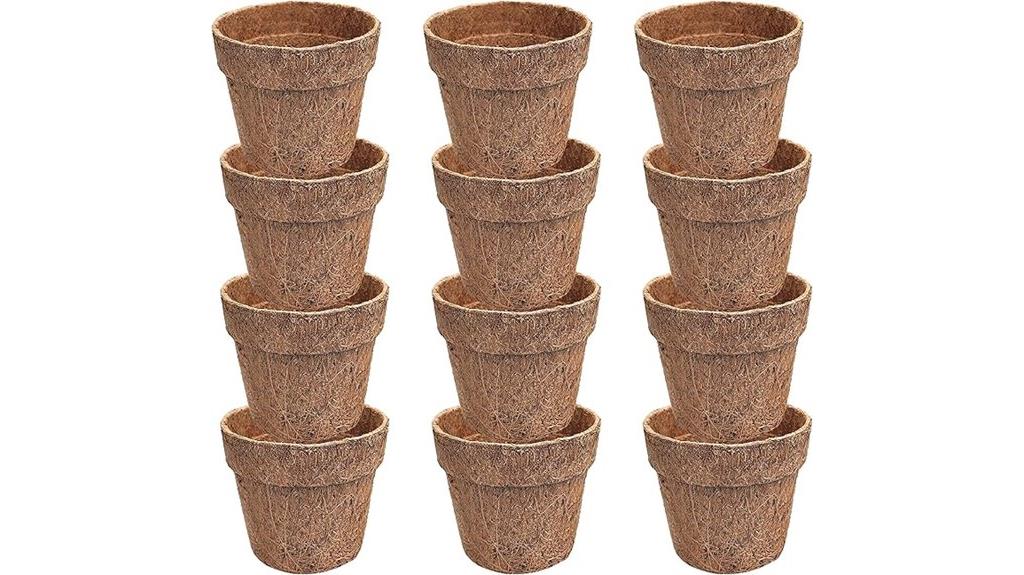
Deepthi 4-Inch Coco Coir Nursery Pots stand out as an eco-friendly choice for anyone looking to start seedlings sustainably. Made from renewable coconut fiber, these biodegradable pots are perfect for seed starting, propagation, and transplanting. The pack includes 12 lightweight, durable pots that support healthy root development, airflow, and reduce transplant shock. Suitable for indoor and outdoor gardening, they can be planted directly into soil, eliminating root disturbance. Crafted from natural coir peat, they decompose naturally, enhancing sustainability. These versatile pots are praised for their size, strength, and eco-friendliness, making them an excellent alternative to plastic options for eco-conscious gardeners.
Best For: eco-conscious gardeners and plant enthusiasts seeking sustainable, biodegradable seed starting pots for indoor and outdoor gardening.
Pros:
- Made from renewable coconut fiber, eco-friendly and biodegradable.
- Supports healthy root growth, airflow, and reduces transplant shock.
- Suitable for various plants and easy to plant directly into soil, minimizing root disturbance.
Cons:
- Some users may experience difficulty separating or heating the coir material.
- Limited to 4-inch size, which may not accommodate larger seedlings.
- As natural fiber pots, they may be less durable than plastic alternatives over extended use.
KEILEOHO 200 Cells Peat Pot Trays for Seedlings
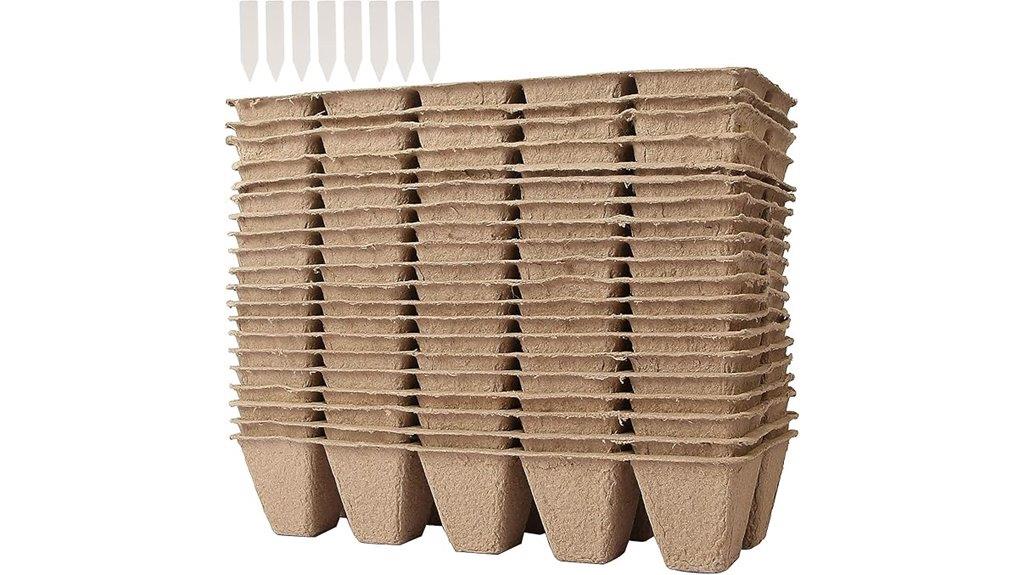
If you’re looking for an eco-friendly way to start seedlings without the hassle of transplant shock, KEILEOHO 200 Cells Peat Pot Trays are an excellent choice. These trays come in a pack of 20, featuring biodegradable pulp and plant fiber that decompose naturally, enriching the soil. Each tray has 200 individual cells, ideal for germinating diverse plants like vegetables, herbs, or flowers. The trays’ design promotes healthy root growth, allowing roots to stretch freely without damage. Plus, you can transplant seedlings directly into your garden, eliminating root disturbance. They’re sturdy, breathable, and include labels for easy plant identification.
Best For: gardeners, horticulturists, or hobbyists seeking an eco-friendly, damage-free way to start seedlings and transplant plants directly into soil.
Pros:
- Made from biodegradable organic pulp and plant fiber, environmentally friendly and decomposes naturally.
- Allows for healthy root growth and easy transplanting without root shock or damage.
- Comes with 200 individual cells and labels, providing ample space for diverse seedlings and easy identification.
Cons:
- Slightly heavier than plastic trays, which may affect portability.
- Requires careful handling to prevent tearing of the biodegradable pulp.
- Limited to seed starting and may not be suitable for larger plants or mature transplants.
20 Pack Peat Pots with Labels for Seedlings and Gardening
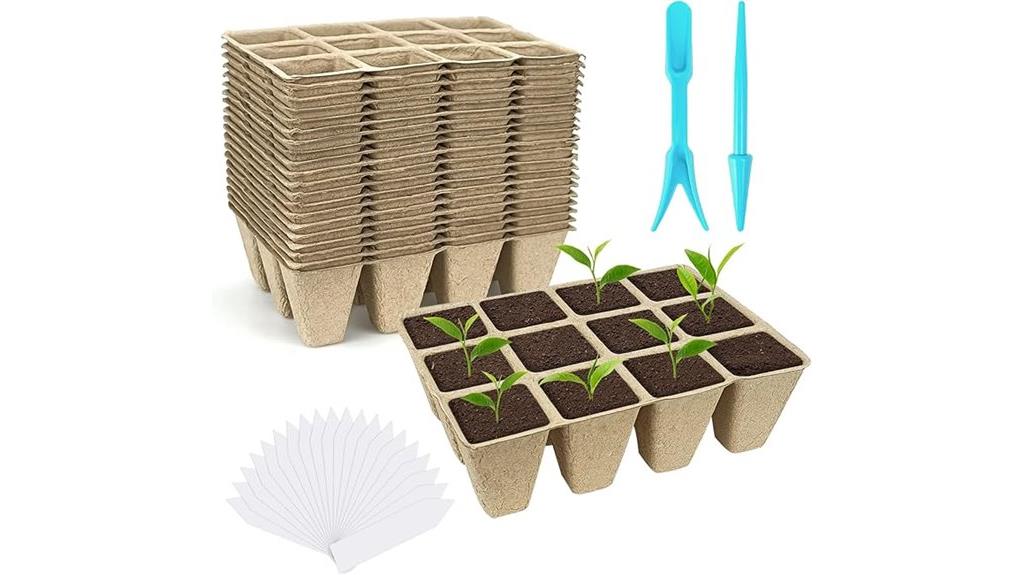
For gardeners seeking an eco-friendly solution, 20 Pack Peat Pots with Labels offers a convenient starter kit that simplifies seedling propagation. These biodegradable trays include 240 pulp pots, perfect for indoor and outdoor use. Each tray features 12 cells, measuring 6.5 x 4.7 x 2 inches, with individual pots of 1.6 inches square. The set comes with plant labels and a small shovel, making it easy to organize and identify your seedlings. Made from sturdy, recyclable corrugated pulp, they’re designed for durability and plant protection. While some users find the pots smaller than expected and note they start degrading when wet, they remain an eco-friendly, practical choice for gardening beginners.
Best For: beginner and eco-conscious gardeners seeking an affordable, biodegradable seedling starter kit for indoor and outdoor planting.
Pros:
- Environmentally friendly, biodegradable, and recyclable materials.
- Comes with useful accessories like plant labels and a small shovel for organization.
- Suitable for starting a variety of plants, including vegetables and flowers.
Cons:
- Pots are smaller than expected and may require tearing or adjustments.
- Some users report pots starting to degrade or fall apart when wet.
- Lack of drainage holes can limit water management options.
Factors to Consider When Choosing Biodegradable Seedling Pots
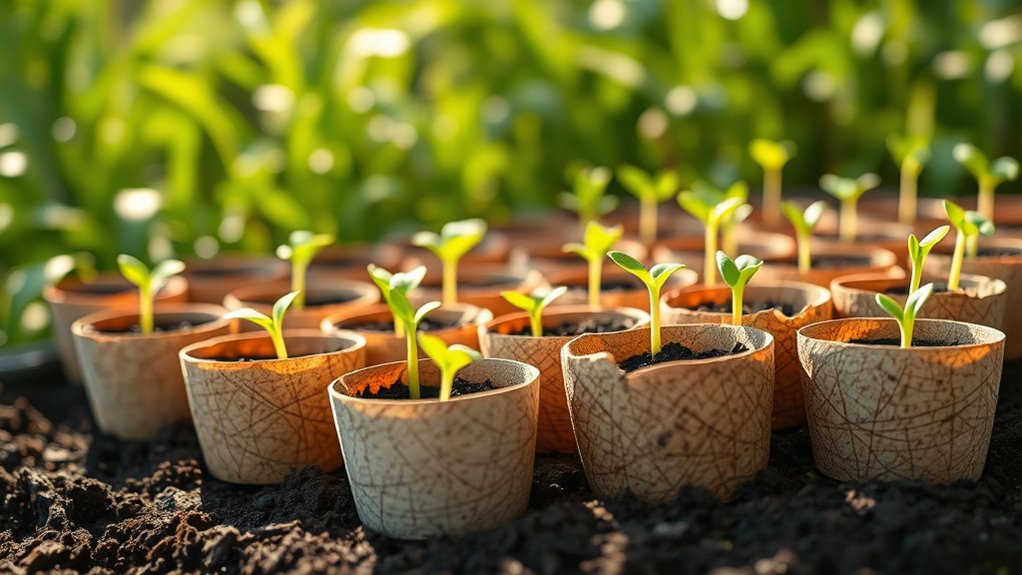
When choosing biodegradable seedling pots, I consider factors like material strength and how quickly they break down to match your planting needs. Size and water drainage are also key to ensuring healthy seedlings and easy transplanting. Ultimately, I look at their environmental impact to pick options that are both effective and sustainable.
Material Durability and Strength
Choosing biodegradable seedling pots requires careful attention to their material durability and strength, as these factors determine how well the pots withstand handling, watering, and transplanting. The materials used—like paper pulp, peat moss, coconut coir, or plant fibers—affect their overall robustness. Thicker, denser materials tend to be stronger and more resistant to tearing or disintegration, even when wet. However, they might be less eco-friendly or biodegradable. Conversely, thinner or lower-density options may degrade faster, risking damage before seedlings are ready to transplant. Proper manufacturing techniques, such as compressing the material or adding binding agents, can improve strength without sacrificing eco-friendliness. Striking the right balance between durability and biodegradability is essential for successful seedling growth and transplanting.
Biodegradation Speed and Timing
The speed at which biodegradable seedling pots break down is a crucial factor to contemplate, as it directly impacts both plant health and soil quality. If they decompose too quickly, they may not support seedlings long enough, while slow breakdown can interfere with planting schedules and soil stability. Typically, materials like peat, pulp, or coir take from a few weeks to several months to fully decay. Many pots are designed to decompose within 3 to 6 months, aligning with typical seedling growth cycles. Environmental conditions such as moisture, temperature, and microbial activity influence this process—warmer, wetter conditions accelerate degradation. Knowing the timing helps me select pots that break down when most beneficial, ensuring healthy roots and minimal soil disturbance during transplantation.
Size and Plant Compatibility
Selecting the right size biodegradable seedling pots is essential for ensuring healthy plant development. The pot should match the mature size of the plant to prevent root bound conditions or wasted space. Small pots, around 2-3 inches, are ideal for starting herbs and flowers, while larger ones, 4 inches or more, support vegetables and bigger seedlings. Compatibility between pot size and plant type promotes proper root growth, drainage, and easier transplanting without damaging the seedling. Using appropriately sized pots helps reduce transplant shock by giving roots enough room to expand before moving outdoors or into larger containers. Choosing a pot size that aligns with the plant’s growth needs guarantees better nutrient absorption and overall seedling success, leading to healthier, more robust plants.
Water Absorption and Drainage
Have you ever wondered how water absorption and drainage impact the health of your seedling pots? Proper water absorption keeps soil moist enough for healthy germination and growth, while good drainage prevents waterlogging that can cause root rot and mold. Pots that are too porous or thin might dry out quickly, meaning you’ll need to water more often to keep seedlings happy. On the other hand, materials with high water retention can maintain moisture but also risk overwatering if drainage isn’t adequate. Striking the right balance between absorption and drainage is key. It creates an environment where roots can develop strongly and transplant success is more likely. Choosing pots with appropriate drainage holes and moisture retention capabilities is essential for healthy seedlings.
Environmental Impact and Sustainability
Considering the environmental impact when choosing biodegradable seedling pots is essential for sustainable gardening. These pots are made from natural materials like paper pulp, peat moss, coir, or plant fibers, which naturally decompose into organic matter and enrich the soil. Using them reduces plastic waste and minimizes pollution compared to traditional plastic seed trays. They support eco-friendly practices by allowing seedlings to be transplanted directly into the ground, eliminating waste and reducing transplant shock. The decomposition rate varies depending on the material and conditions but generally occurs within weeks to months. Choosing biodegradable pots promotes a circular gardening system that conserves resources, improves soil health, and lowers your carbon footprint. It’s a simple step toward more sustainable and environmentally responsible gardening.
Ease of Transplanting and Handling
Choosing the right biodegradable seedling pots can make transplanting much smoother and less stressful for both the gardener and the plants. Pots that break down easily in soil allow for seamless transplanting without damaging roots or disturbing seedlings. Flexible, soft materials are easier to handle during planting, reducing the chance of breakage. Drainage holes are essential for proper water flow, making the process cleaner and more efficient. Lightweight and uniformly sized pots simplify movement and handling, especially for beginners. Additionally, pots with clear markings or labels help keep things organized, ensuring seedlings are transplanted into the right spots at the right time. Overall, these features make transplanting hassle-free and promote healthier plant growth.
Price and Cost-Effectiveness
When selecting biodegradable seedling pots, evaluating their price and overall value is essential to making a smart investment for your garden. Comparing prices across different options helps identify the most cost-effective choice for your needs. Buying in bulk or larger pack sizes often offers better value per pot, reducing overall costs. It’s also important to take into account the quality and durability of the materials, as higher-quality pots may last longer and minimize replacements or damage. Sometimes, spending a bit more upfront on better pots can improve seedling survival and decrease transplant shock, saving money later. Additionally, factoring in the cost of accessories like labels or tools ensures you’re considering the full expense of your seed-starting setup.
Additional Accessories and Features
Including useful accessories with biodegradable seedling pots can make gardening more efficient and successful. Many sets come with labels or markers, helping me easily identify different plant varieties. Some include mini shovels or transplant tools, which make handling seedlings gentler and transplanting smoother. Accessories like humidity domes or trays can boost germination rates by maintaining the right moisture levels. Features such as drainage holes and customizable cell sizes are also important—they promote healthier growth and suit various seed types. Bundled kits that include multiple accessories help me stay organized, reducing the need for extra purchases. Overall, choosing pots with these added features can streamline my gardening process and improve my plants’ success.
Frequently Asked Questions
Are Biodegradable Seedling Pots Suitable for All Plant Types?
You’re wondering if biodegradable seedling pots suit all plant types? I’d say they’re generally versatile, but it depends on the plant’s specific needs. Most seedlings thrive in these pots because they break down naturally, enriching the soil. However, for plants with long growing periods or extensive root systems, I suggest checking if the pot can support their growth until transplanting. Overall, I’ve found them suitable for a wide range of plants.
How Long Do Biodegradable Seedling Pots Typically Take to Decompose?
You’re probably wondering how long biodegradable seedling pots take to decompose. In my experience, it varies based on material and conditions, but most typically break down within 3 to 6 months. Warmer, moist environments speed up the process, while cooler or drier conditions slow it down. I recommend checking the manufacturer’s info for specific timelines, but generally, they’re designed to decompose quickly once planted in the soil.
Can Biodegradable Seedling Pots Be Reused for Multiple Planting Seasons?
Think of biodegradable seedling pots as a delicate dance partner—flexible but needing proper care. I’ve found that most aren’t designed for multiple seasons, as they tend to weaken after their first use. While some thicker options might be reused once or twice, I recommend using fresh ones each season to guarantee healthy growth. Reusing can compromise their integrity and the plant’s health, so I’d suggest replacing them regularly.
Are Biodegradable Seedling Pots Safe for Organic Gardening Practices?
I believe biodegradable seedling pots are safe for organic gardening because they’re made from natural materials that break down without harming the soil or plants. I always double-check that they’re free from synthetic chemicals or plastics, ensuring they meet organic standards. Using these pots supports eco-friendly practices, and I find them convenient since they decompose naturally, enriching the soil and reducing waste.
What Environmental Impacts Do Biodegradable Seedling Pots Have Compared to Plastic?
When I consider the environmental impacts, I see biodegradable seedling pots as a much better choice than plastic. They break down naturally, reducing pollution and landfill waste. Unlike plastic, which can take centuries to decompose and releases harmful chemicals, biodegradable pots support soil health and lessen environmental harm. Switching to them helps me minimize my ecological footprint and promotes sustainable gardening practices for future generations.
Conclusion
So, which of these eco-friendly seedling pots will you choose to kickstart your gardening journey? Each one has its unique perks, but I’ve left you hanging—there’s one that might just change everything for your plants and the planet. Curious? Explore the options, weigh the factors, and see which biodegradable pot will be your new gardening secret. Trust me, the right choice could transform your green space in ways you never expected.

